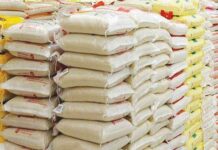Israel hits Rafah despite US warning on arms transfers
Smoke rose from strikes on Gaza’s crowded southern city of Rafah Thursday after US President Joe Biden vowed to stop supplying artillery shells and other weapons to Israel if a full-scale offensive into the city goes ahead.
It was the starkest warning yet from the United States, Israel’s main military provider, over the civilian impact of its war against Hamas Palestinian militants.
An AFP correspondent and witnesses on Thursday reported strikes on several parts of Rafah, where the United Nations said 1.4 million people were sheltering.
“The tanks and jets are striking,” Tarek Bahlul said on a deserted Rafah street. “Every minute you hear a rocket and you don’t know where it will land.”
Israel has already defied international objections by sending in tanks and conducting what it called “targeted raids” in eastern Rafah, the city it says is home to Hamas’s last remaining battalions.
In an interview with CNN on Wednesday, Biden warned he would stop some US weapons supplies to Israel if it carried out its long-threatened major Rafah ground offensive.
Israel on Thursday called Biden’s comments “very disappointing”.
Biden told CNN: “If they go into Rafah, I’m not supplying the weapons that have been used… to deal with the cities.”
“We’re not gonna supply the weapons and the artillery shells that have been used.”
Asked about Israel’s action already in Rafah, Biden said “they haven’t gone in the population centres”.
READ ALSO:
Israel attacks Iran with barrage of missiles
Bomb delivery halted
The fresh warning came after his administration paused delivery last week of 1,800 2,000-pound (907-kilo) bombs and 1,700 500-pound bombs as Israel appeared ready to attack Rafah.
“Civilians have been killed in Gaza as a consequence of those bombs,” Biden said. “It’s just wrong.”
Ties between the allies have become increasingly strained as Biden and other top Washington officials criticise Israel over its conduct of the war.
Pro-Palestinian protests have flared at universities across the United States and globally with an intensity not seen for decades.
The Gaza war began with Hamas’s unprecedented October 7 attack on Israel, which resulted in the deaths of more than 1,170 people, mostly civilians, according to an AFP tally of Israeli official figures.
During their October attack militants seized Israeli and foreign hostages, of whom Israel estimates 128 remain in Gaza, including 36 who the military says are dead.
Israel in response vowed to crush Hamas and free the captives. It began a military offensive that has killed at least 34,904 people in Gaza, mostly women and children, according to the Hamas-run territory’s health ministry.
More deaths
The ministry on Thursday reported at least 60 more deaths over the previous 24 hours. Since Monday, when Israel ordered eastern Rafah residents to evacuate, the daily reported toll has been above 50, up from a peak of 33 earlier in May.
The United Nations agency for Palestinian refugees, UNRWA, said Thursday 80,000 people have fled Rafah since Monday, but “nowhere is safe”.
On Tuesday Israel seized Rafah’s border crossing into Egypt, which had been the main entry point for aid.
The White House condemned the aid disruption, and the defence secretary later confirmed Washington had paused the bomb shipment.
In Israel’s first reaction to Biden’s threat, its UN ambassador Gilad Erdan called it a “very disappointing statement”.
“If Israel is restricted from entering an area as important and central as Rafah where there are thousands of terrorists, hostages and leaders of Hamas, how exactly are we supposed to achieve our goals?” he said on public radio.
Ari Tolany, who follows the arms trade for the progressive Center for International Policy, doubted the halt would have “an immediate operational impact”, but it sent a message to Israel not to drop 2,000-pound bombs, as it already has in the war.
Israel’s military said Wednesday it was reopening another aid crossing into Gaza, Kerem Shalom, as well as the Erez crossing into north Gaza.
But it was unclear if aid was entering the territory where, according to the World Food Programme’s chief, famine has already begun.
Living in a trailer
UNRWA said the Kerem Shalom crossing — which Israel shut after a rocket attack killed four soldiers on Sunday — remained closed.
Late Wednesday, the army said a soldier was lightly wounded when rockets again targeted Kerem Shalom.
The Hamas authorities’ “emergency committee” in Rafah said Thursday Israel’s “control of the Rafah crossing and its closure, along with the halt of aid and fuel supplies, threatens to exacerbate the humanitarian, environmental, and health catastrophe”.
It dismissed as “nothing but lies” Israel’s description of its Rafah operation as “limited”.
Another Hamas official said Israel’s operations in Rafah and the border crossing “aim to obstruct the efforts of the mediators” at Cairo truce talks.
The World Health Organization said Wednesday hospitals in southern Gaza had only three days of fuel left.
Fuel is critical to aid operations, not only for powering hospital equipment but also enabling aid workers to move, and to keep bakeries running, said Rik Peeperkorn, WHO representative in the Palestinian territories.
At a makeshift refugee camp in Rafah, Mazen al-Shami said she was fed up.
“We have no money and we don’t have the means to move from one place to another again and again. We have no means at all,” Shami said.
Alongside the strikes in Rafah, Israel’s military on Thursday said air strikes had hit around 25 targets in the Zeitun area of Gaza City, north Gaza.
Talks involving Qatari, US and Hamas delegations aimed at cementing a long-stalled ceasefire deal would continue Thursday in Cairo, said Al-Qahera News, which is linked to Egyptian intelligence.
It added, citing an informed source, that Islamic Jihad, which is fighting alongside Hamas, and the Marxist Popular Front for the Liberation of Palestine, were also participating and “are open” to reaching a deal.
AFP














